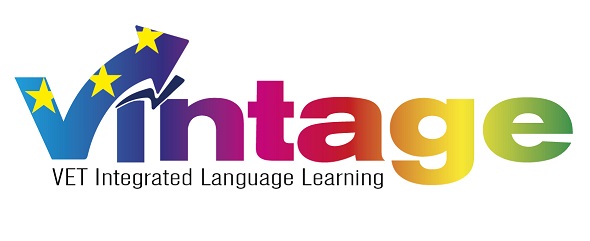Institute of Research and Information on Volunteering

 VINTAGE- VET Integrated Language Learning
VINTAGE- VET Integrated Language LearningMigrations and mobility of the workers play a fundamental role in fostering a flexible and competitive job market at the European level. In order to reach the objectives defined by the Europe 2020 Strategy, making social cohesion and an inclusive society two pillars of EU competitiveness, migrants and mobile workers have to play not only their role as additional workforce to be exploited according to economic needs, but the role of protagonists in the social and professional arena; in other words they should be able to act as “European citizens”, having equal opportunities of professionalization, in the hosting society. Communication and linguistic skills are the basis of mutual understanding and interaction, therefore an asset for gaining citizenship rights and professional development. They enable a good integration between local populations and foreign people, letting intercultural dynamics and encounters be elaborated in a balanced way by all components of the society. At the same time, in the job market grows the importance of communication skills. Globalization of migration flows hamper the traditional use of common languages spoken by migrants in order to manage ordinary communication and cooperation at the workplace. New organizational patterns, and new technologies determine a parallel increase of linguistic skills required by any kind of workers, even low qualified – both considering understanding, reading and speaking, but also a certain mastery of written communication, related to the pervasive use of reporting, data storage, feed-backs.
Drawing on some recent project and initiatives, valuing an experienced partnership, the proposal aims at innovating language learning practices, shifting towards a “learner centered” perspective, capable of making training more effective and adequate to a rapidly changing context, both considering needs emerging in the companies and at societal level, and expectations of the learners.
Integrating language learning and educational / professionalization pathways is the opportunity and the challenge faced by the project, aiming at raising awareness of innovative methods and supporting teachers and trainers develop their competences in managing these processes.
The learning of a second language, spoken in the hosting country, is probably the key challenge for any migrant moving from one country to another, looking for better job and life opportunities. Both demand evolution, and the complexity of communication skills needed to live in an active way in modern societies, make linguistic skills a fundamental investment for any migrant or mobile worker. Policies adopted by EU Member States in order to facilitate integration, through the acquisition of communication skills, are nonetheless differentiated; in most of the countries the knowledge of a local language is becoming a sort of pre-requisite for being accepted as a legal resident; sometimes language courses are “strongly recommended” for this reason to the migrants as an anticipatory measure (preparatory courses), in other cases they are provided to the beneficiaries, with the help of financial resources, as an opportunity addressed at least to new comers. Moreover in other situations language learning is encouraged, but left to individual decisions and investments. In any case to learn the language spoken in the hosting country rapidly became a common challenge for the migrants, facing the evolution of job demand (also relatively low qualified jobs need good communication skills) and moving in a selective job market.
Language learning, as any human learning activity, clearly depends on diverse dimensions and triggers:
- from cognitive potentialities and personal learning styles (it implies the need of differentiating training offers according to divergent needs),
- from affective dimensions and motivations (learning always depends from proximity of learning achievements to interests and preoccupations of the learners, as well as to his/her participation to the definition of achievable and shared learning outcomes),
- from relational and social enablers of learning (being the interaction a critical dimension playing a role of the utmost importance in language learning).
We should move from a mere “training perspective”, implying consolidated didactical strategies, towards a “learner centered” one. This conceptual and practical shifting could enable innovative approaches to language learning, capable of making it more effective and adequate to a rapidly changing context, both considering needs emerging in the companies, and expectations of the learners.
From the operative point of view, the project aims at designing and testing (using English as a work language, French, German and Italian as target languages):
- an innovative learning approach
- A workbased / workplace learning program
- A flexible model for designing and planning learning (focusing on competences from A1 to B1)
- assessment (summative) and formative evaluation procedures
- A comprehensive set of resources and qualification means for teachers and trainers, organized in a Web Resource Centre.
Dissemination will cover the European dimension.
January 2014- December 2016
Fondation ECAP (leader)
Universita per Stranieri di Perugia (Italy)
Arbeit und Leben Hamburg e.V (Germany)
Iriv (France)
Centro territoriale permanente di Gallarate (Italy)
European Centre for Women and Technology (Norway)
Militos Emerging Technologies & Services (Greece)